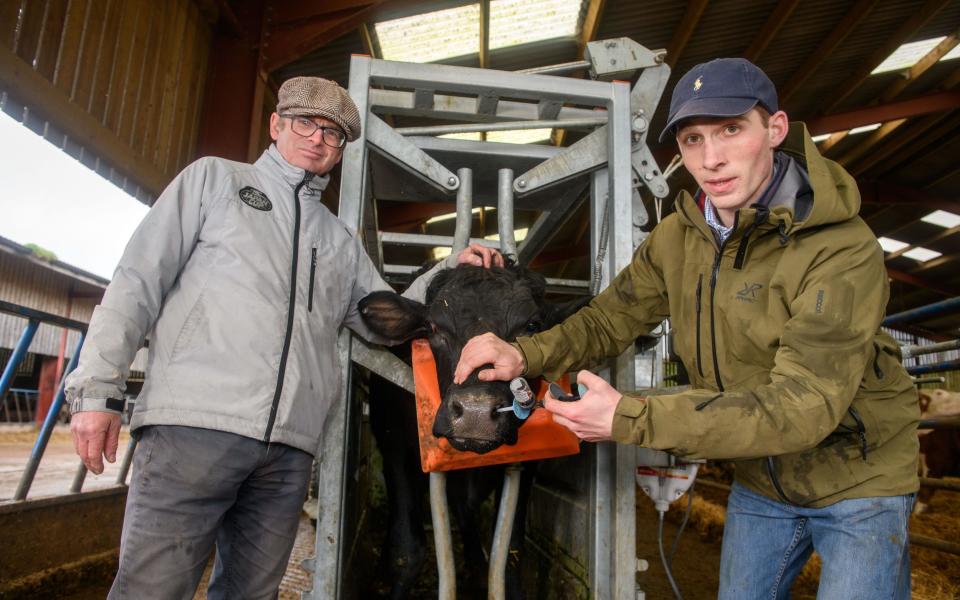I knew forty years ago that three years of agricultural education would come in handy, but never imagined it would help Harry Cobden, ‘first the jockey, then the farmer’, to sort out a consignment of cattle recently from the Salisbury market arrived.
Cobden heads into the Cheltenham Festival with a select group of horses to ride for boss Paul Nicholls, including Bravemansgame, the ‘forgotten horse’ in the Gold Cup, and has the momentum in the jump jockeys’ title race, whom he leads by 10 Sean leads. Bowen.
The 25 cattle, which he will fatten into beef, have arrived weighing about the same as a thoroughbred, 450-600 kg (71-94st). He comments on which, given their size and build, will grow fat the best, estimates the weight of most under 10 kg and says that, despite the eco-fanatics and the vegan brigade, in his experience there has never been such a large demand has been for beef this time of year. In what I see as a skinny little sub, he sees the most profit potential.
Each animal is weighed, vaccinated, dewormed, deloused as a precaution and the hair along the spine is cut to prevent it from sweating. If it were to sweat, Cobden, with the built-in farmer in him and his stockman’s eye, would see pound notes instead of evaporating steam.
I’m busy weighing and delousing – I should be flea-free for at least a while – and he hands me his electric clippers to get one cut.


Bearing in mind that he is aiming for practical aspects of the fattening process rather than winning the best results in the Cheltenham parade ring, he looks too long and hard at the result, which I think would help me, based on a work experience. basics, get started right away at my local Turkish hairdresser.
“I’m a bit obsessive-compulsive about this, I’m afraid,” he says, taking back the clippers. “Looks like a rat gnawed on it.”
With one of the busiest tracks in Britain – the only other jockey to fully cope as a first jockey at Nicholls was Ruby Walsh – he expanded the family farm’s beef operation with the help of prize money and the bank is the perfect foil.
But citing the “farmer code,” he is reluctant to report the numbers of cattle he sends to the slaughterhouse. “A truckload a week,” he says vaguely, but it seems like the farm is punching well above its weight given its size.
It is ironic that 25-year-old Cobden took up racing mainly because the 200-acre family farm and 350 acres of rented land at Lydford-on-Fosse in Somerset would never be big enough to support him and his older brother James. only his practical mom and dad.
But James turned out to be allergic to cows and Cobden’s youthful energy stimulates the construction of more barns and cattle sales.
Given his day job, no one relies on him for the routine tasks of feeding and bedtime, but on an increasingly rare day off, he doesn’t rest; he will find something that needs to be done.
“It’s probably an antidote to horse riding,” he agrees. “After racing I come back here and always go to the farm in the evening. It takes your mind off a bad day when something went wrong. I take the dogs with me, walk among the cattle and it takes my mind off work.”
He also agrees that some of his predecessors found it difficult to drive for Nicholls. “I understand why,” he says. “Paul Nicholls is a winner. Every race, whether it’s a Grade One or a Taunton Seller, means a lot to him.
“One of the worst things I experienced was one day in Stratford in the summer. I wasn’t very good at it. And he let me know.” But with six years under your belt, there’s a certain amount of knowing what the other person is thinking.


“I find it a lot easier now,” he continues. “The most important thing is that I know how he feels about his horses being ridden; useful with a little light. He doesn’t want bad luck stories where you took the shortest route, got no luck and can’t get out. He doesn’t deal with that very well at all. This is my sixth season there, but the last few seasons have been a lot easier.
‘On those big days he doesn’t bother me. We discuss things in the morning or the day before. He will ask what I think about a race and he will give his opinion on what I think. If he wants a horse to be ridden a certain way – yes, no problem. We have a pretty good relationship on the track.”
Cobden’s laid-back nature is also positive in the relationship. “If I did something wrong during a race, I might be a little frustrated for a few minutes, but in reality that race is over,” he explains.
“You learn from it and try not to make the same mistake again. If you have a decent job like mine, you have good opportunities every weekend. If you mess up one, try to put it right again 30 minutes later.
With Cheltenham in his sights, he says winning the jockey title was never his burning ambition, although he has a good chance of doing so and will need help from Nicholls, who despite fourteen trainer’s titles has never been kingmaker when it comes to jockeys.
“I would prefer to win the Gold Cup,” says the jockey whose diet is obviously based on red meat and, in stark contrast to the past, good rather than no hydration. “We have been quite selective, but last season I did 440 rides and this season there are already around 580.
“This jockey championship is getting more and more attention and people are posting [on social media] where we go every day. I think it’s a little more exciting. When someone is 30, there is nothing to talk about. But on October 6, when I was 49 behind, it didn’t look very realistic and then, unfortunately for Sean, he got injured for five weeks and we got back on level terms. There are not many people who can say they have been a champion jockey.”
If there’s one place Cobden feels as comfortable as the weigh room, it’s at the cattle market or among the cows, but for now racing is the top priority in his life. “I’m in a good position,” he says, “and I’m not going to throw that away. Agriculture can wait.”